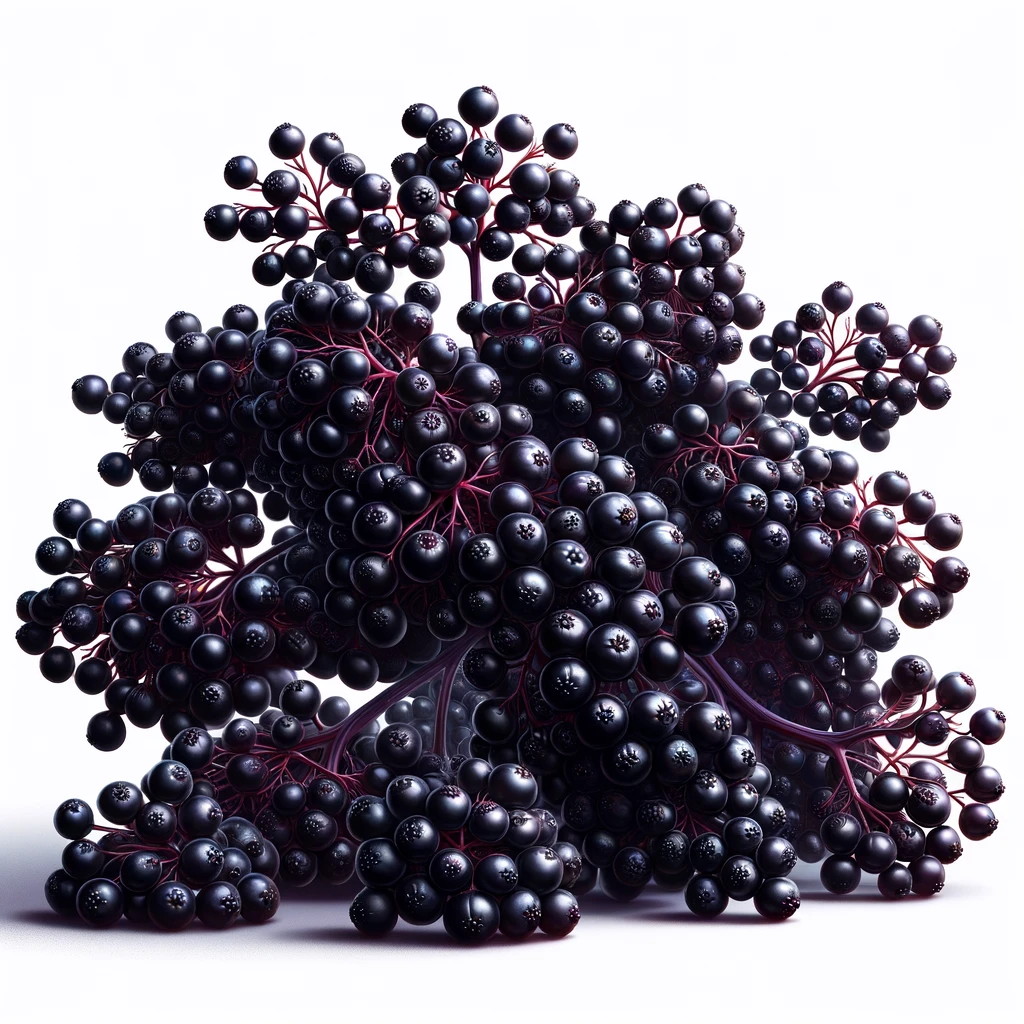Elderberries, the tiny dark purple berries from the Sambucus tree, have been used for centuries in traditional medicine and culinary practices. These small but mighty fruits are packed with an impressive array of nutrients and bioactive compounds that offer a multitude of health benefits. Let’s dive into the nutritional content and health benefits of elderberries and explore why they are a powerhouse for maintaining and improving your health.
Nutritional Content of Elderberries
Elderberries are rich in essential vitamins, minerals, and phytonutrients that contribute to their health-promoting properties.
Vitamins and Minerals
- Vitamin C: Elderberries are an excellent source of vitamin C, providing about 36 mg per 100 grams. Vitamin C is crucial for a healthy immune system, skin health, and antioxidant protection.
- Vitamin A: These berries contain beta-carotene, which the body converts into vitamin A, essential for vision, skin health, and immune function.
- B Vitamins: Elderberries provide small amounts of B vitamins, including B6, which is important for brain health and metabolism.
- Iron: Elderberries contain iron, which is vital for oxygen transport in the blood and energy production.
- Potassium: This mineral is essential for maintaining healthy blood pressure and proper muscle function.
Phytonutrients and Antioxidants
- Anthocyanins: Elderberries are rich in anthocyanins, the pigments responsible for their deep purple color. These powerful antioxidants help protect cells from oxidative damage and support overall health.
- Flavonoids: Elderberries contain various flavonoids, including quercetin and kaempferol, which have anti-inflammatory and immune-boosting properties.
- Phenolic Acids: These compounds have antioxidant and anti-inflammatory effects, contributing to the overall health benefits of elderberries.
Macronutrients
- Carbohydrates: Elderberries provide around 18 grams of carbohydrates per 100 grams, primarily in the form of natural sugars and dietary fiber.
- Fiber: With about 7 grams of fiber per 100 grams, elderberries support digestive health and help maintain a healthy weight.
Health Benefits of Elderberries
The rich nutritional profile of elderberries translates into numerous health benefits.
Immune System Support
Elderberries are renowned for their immune-boosting properties. The high vitamin C content, along with other antioxidants like anthocyanins and flavonoids, helps strengthen the immune system. Studies have shown that elderberry extract can reduce the severity and duration of cold and flu symptoms, making it a popular natural remedy during the flu season.
Antioxidant Protection
The antioxidants in elderberries, particularly anthocyanins, combat oxidative stress by neutralizing free radicals in the body. This antioxidant activity helps protect cells from damage, reducing the risk of chronic diseases such as heart disease, diabetes, and cancer.
Anti-Inflammatory Effects
Chronic inflammation is linked to numerous health conditions, including arthritis, heart disease, and neurodegenerative disorders. Elderberries’ flavonoids and phenolic acids exhibit anti-inflammatory properties, which can help reduce inflammation and alleviate related symptoms.
Heart Health
Elderberries contribute to heart health by supporting healthy blood pressure levels and reducing cholesterol. The potassium content helps regulate blood pressure, while the fiber and antioxidants promote overall cardiovascular health by reducing bad cholesterol (LDL) levels and preventing plaque buildup in the arteries.
Digestive Health
The high fiber content in elderberries supports healthy digestion by promoting regular bowel movements and preventing constipation. Fiber also helps maintain a healthy gut microbiome, which is essential for overall digestive health and immune function.
Skin Health
Elderberries’ vitamin A and C content, along with their antioxidant properties, support skin health by promoting collagen production, protecting against UV damage, and reducing signs of aging. These benefits can lead to healthier, more youthful-looking skin.
Incorporating Elderberries into Your Diet
Elderberries can be enjoyed in various forms, including fresh, dried, or as an extract. They are commonly used in syrups, teas, jams, and even as a natural flavoring in beverages. However, it’s important to note that raw elderberries and their parts (leaves, stems, and seeds) contain toxic compounds and should not be consumed without proper preparation.
Conclusion
Elderberries are a nutritional powerhouse with a range of health benefits. From boosting the immune system to supporting heart health and protecting against oxidative stress, these small berries pack a powerful punch. By incorporating elderberries into your diet, you can harness their health-promoting properties and take a proactive step towards achieving your best nutritional outcomes. Whether you’re sipping on elderberry tea or enjoying elderberry jam, you can savor the taste and health benefits of this remarkable superfruit.





